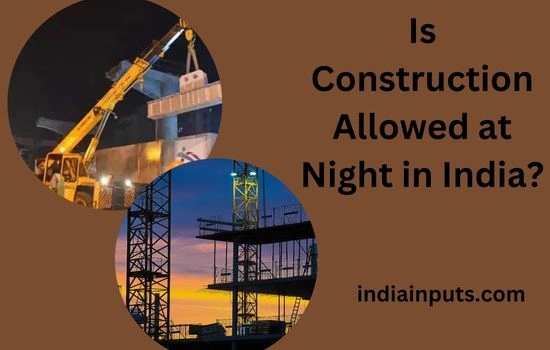In India’s fast-growing urban centers, construction activity often becomes a 24/7 affair to meet the demands of rapid development. However, night-time construction frequently sparks complaints from residents about noise and disruption, raising the question: Is construction allowed at night in India?
The short answer is: Yes, construction is allowed at night in India, but it is regulated by noise pollution laws and municipal guidelines to minimize inconvenience to the public.
Legal Framework Governing Night-Time Construction

1. The Noise Pollution (Regulation and Control) Rules, 2000: This law, framed under the Environmental Protection Act, 1986, governs permissible noise levels in India. The rules divide areas into categories—residential, commercial, industrial, and silent zones—and set specific noise limits for each:
- Residential areas: 55 dB during the day and 45 dB at night.
- Commercial areas: 65 dB during the day and 55 dB at night.
- Industrial areas: 75 dB during the day and 70 dB at night.
- Silent zones (near hospitals, schools, etc.): 50 dB during the day and 40 dB at night.
Construction activities that exceed these limits during night hours (10 PM to 6 AM) are considered a violation and can invite penalties.
2. Local Municipal Regulations: Many cities and states have additional regulations regarding construction timings. For instance, municipal corporations in cities like Delhi, Mumbai, and Bengaluru often impose stricter norms to address noise and air pollution.
3. Special Permissions: In certain cases, night-time construction is allowed with special permissions from local authorities. These are typically granted for projects of public importance, such as metro rail construction, road repairs, or infrastructure projects where daytime activity could disrupt public life.
When Is Night-Time Construction Allowed?
- Essential Infrastructure Projects: Activities related to public utilities, transportation infrastructure, or emergency repairs are often granted exemptions. For example, metro construction and road repairs are typically carried out at night to avoid traffic congestion during the day.
- Industrial Zones: Construction in industrial zones is generally less restricted, provided it complies with permissible noise levels.
- Private Projects with Approvals: Builders can apply for special permissions for night-time work, especially for large-scale projects with tight deadlines.
Challenges of Night-Time Construction
- Noise Pollution: The most common complaint against night-time construction is the disruption caused by heavy machinery and tools, impacting the sleep and well-being of nearby residents.
- Air Quality Concerns: Dust and emissions from construction activity can further deteriorate air quality, particularly in urban areas already grappling with pollution.
- Enforcement Issues: Despite laws, enforcement is often weak, leading to violations and public dissatisfaction.
What Residents Can Do
Residents affected by night-time construction can:
- Lodge complaints with local municipal authorities or police.
- Approach pollution control boards for violations of noise limits.
- File legal action under public nuisance laws if necessary.
Balancing Development and Public Comfort
While night-time construction is often essential for meeting infrastructure goals, it must be balanced with the comfort of the community. Solutions include:
- Using soundproof barriers or quieter machinery.
- Limiting night-time work to critical tasks.
- Engaging with local residents to address grievances proactively.
Conclusion
Yes, construction is allowed at night in India, but it is subject to strict regulations on noise and environmental impact. As urbanization accelerates, it is crucial for authorities, builders, and communities to work together to ensure that development does not come at the cost of public well-being. Thoughtful planning and robust enforcement of regulations can make night-time construction less disruptive while keeping projects on track.

